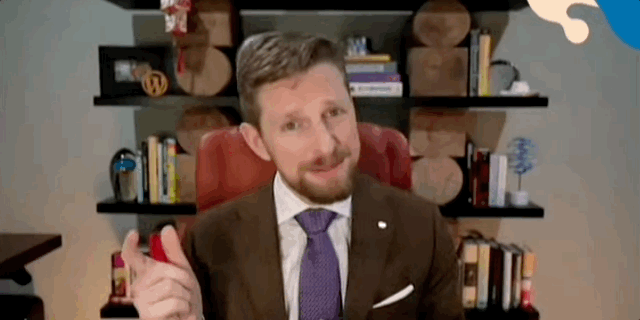👉🏻 FYI here’s a link to the live stream video of where the Q&A starts.
This is a brief overview and highlights of Matt Mullenweg’s presence (usually in the form of a Q&A at WordCamps, now that the annual State of the Word has been separate for a few years). Matt wasn’t able to be there in person, but (despite some technical issues) was able to communicate on the big screen with Josepha Haden and Nirav Mehta hitting on stage in front of him.

Milana Cap was up first asking about resources and funds to allocate for tools, specifically for the #WordPress Docs team, but for teams and possibly per project.
“So the documentation team is not just writing documentation, we have so many things around it that we are working on and we — we are paying tools by our own money, I’m paying a tool by my sponsor’s money from XWP and if we could have some kind of support for those kinds of things, logistic that we are doing, to be able to do what we do for WordPress, that would be so helpful.”
Milana Cap
Matt said Automattic (or WordPress project?) would pay for tools if they had, but stressed considering open source solutions first. He did make it very clear that “If there’s ever something you need, don’t hesitate to get in touch with the Meta team if you need a tool sponsored.”
It was a bit of an awkward slow start to a Q&A but with all things considered it was a good start and things seemed to pick up as it moved along.
A short time later Matt also mentioned this, more in passing it seemed but i caught it…
Which lead to a few initial reactions:
Matt added:
“It is not up to the standard of what WordPress, itself, provides, which is world-class software. Inside the core software, I think we’re doing pretty decent and in many places, fantastic job of many things. But we haven’t yet been able to translate that to the project surrounding it, including WordPress.org itself. So it’s very, very much on my mind and something I’m been talking to Josepha. Sometimes we need more DRIs, Direct Responsible Individuals. Maybe try that approach a little bit more than necessarily the consensus, which we’ve been attempting now for several years.”
Matt Mullenweg
My $0.02 (with my limited understanding) on this was (and still is) that the the speed of the redesign of http://WordPress.org isn’t going quickly enough. Perhaps not as quickly for a community and influence as large as WordPress as might go with other organizations. And not just development (the grunt work as it were) but maybe management and coordination. This fits in with Matt’s comment on Direct Responsible individuals and Matt also mentioning “too often, we are doing, particularly design by committee and trying to develop a consensus and everything and it would probably be better if we just chose a single person.”
Hearing Matt comment about “being embarrassed about WordPress.org” was a mix of raised eyebows and appreciation of an honest opinion, but it makes sense once you view the context. Of course the pandemic and Matt’s lean toward’s open source being a non-paid contribution (while sponsored work is ok) might not make this easy.
I will say that the foundation side of WordPress, as you know, had no employees. So, no one gets paid by the foundation. We do do grants and scholarships and things like that, but it’s not really set up to be an employment entity. It is a place where people can come together, regardless of who employs them or how they get paid and work together on something. I realize that this isn’t for everyone. And, that a number of folks, as part of their Five for the Future contribution, they get sponsored.
Matt Mullenweg
It might simply be a matter of time and power too. Glad to see Matt addressing this. But moving on!

WordPress being taught in schools was brought up and Josepha’s comment is good to take in:
“WordPress moves too fast for them to be able to build curriculum…. It’s also kind of like a “power to the people” sort of thing and schools find that moderately alarming.”
Josepha Haden
On a brighter note, Matt did create the Kids Camp Slack channel live during the Q&A.
Michelle Frechette then asks that with the layoffs we’ve seen what did Matt think that – as a community – can do to create more jobs and stop the anxiety and fear that comes with the layoffs we’ve seen.

Matt:
“I think actually WordPress can benefit from recessionary times, as well, because we provide one, economic agency where people can do things themselves, people can be entrepreneurs.”
“People with WordPress skills to look at businesses in their area who might be spending more on some of these other services and give them the opportunity to bring them to WordPress.”
“I can’t think of an developer application that hasn’t had a GitHub link. Contributing is a great way to fill those holes in your resume, as well.”
And also:
Matt got asked about ChatGPT, AI, and how it would effect open source. His response:
Matt also mentions the recent published “ChatGPT is a Blurry JPEG of the web” which I would recommend reading.
Matt says WordPress has “10x times the number of domains using it as the number two competitior Spotify” and “I could see WordPress being around – not just around, but core to the fabric of the web 100 years from now and I would love to attend a WordCamp Asia in my 80s.”
Matt got asked about the WordPress onboarding procedure (the 5 minute install for the most part). His response was to plan for the WordPress onboarding process to be serviced by hosting provides and there has been a ton of innovation in the onboarding flow. But there’s so much AFTER the WordPress onboarding experience to consider as well – with Gutenberg serving as the blank canvas that users get to and need to be able to use.
On localization and translation especially for Asian countries Matt would love to some improvement there:
On WordPress getting a “bad wrap” thanks to bad hosting and opportunities for hosting companies to improve:
Matt also stressed keeping plugins updated and he’s excited about SQLLite enhancements possibly coming:
Matt on the “lack of data” on WordPress.org plugin direct page and how we can get more feedback to plugin developers:
Matt also mentioned, in a response to another question, that he feels that the “title” field for a WordPress post should no longer be required… similar to how in Twitter you don’t need to add a title to write something.
I’ve been talking a lot about this and some of the Gutenberg team, how can we make it easier, both in theming and the Core interface to really make titles more optional because I just want people to be able to feel like they can post anything to their blogs. A little bit how bloggings evolved with people talking about SEO and findability takes a little bit of fun and spontaneity.
I used to post hundreds of times her year. I think it is more like writing a college essay. Just if we can lower those barriers to entry and make people comfortable with posting silly things or just posting a link or just posting a you tube embed or something and not every blog post having to be, like, a huge thing, with a title and paragraphs and, you know, SEO-optimized and featured image and all that sort of, you know, kind of additional burden we put on a post. It’s great to allow that, but I think that kind of microblogging is something that I want to make a lot more effortless within an interface.
Matt Mullenweg

Matt ends the Q&A answering a question on how we as the WordPress community can show off WordPress that it’s “not just for cheap website but can be even for Enterprise applications”. In a word: examples.
My quick answer is nothing is as good as showing examples. So, doing excellent work and then raising the profile of those and I know we’ve redesigned the showcase, but I really want to make this a lot more prominent and I want every single Rosetta site to have a really prominent showcase so by elevating the best examples of WordPress, I think that is better because we can, you know, say all day that WordPress is secure, it’s performant, but being able to point to a site, like whitehouse.gov, that switched to WordPress. Being able to point to examples like that and say, well, if it’s secure enough for the White House, like, it’s secure enough for you probably, is really, really helpful.
Matt Mullenweg
Note: Longer quotes taken from the transcriptions and the tweets and shorter quote from my imperfect human ears.











































































































